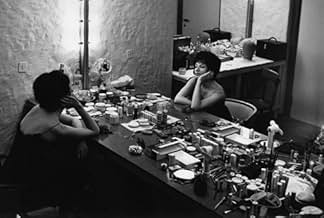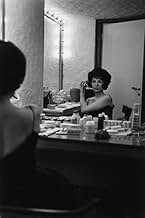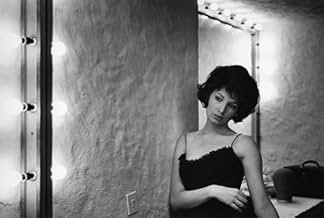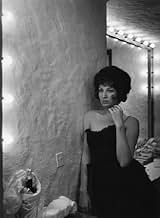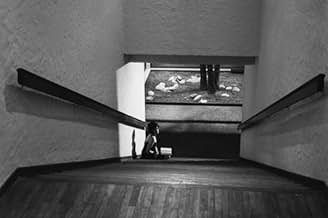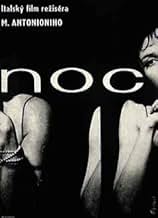A day in the life of an unfaithful married couple and their steadily deteriorating relationship.A day in the life of an unfaithful married couple and their steadily deteriorating relationship.A day in the life of an unfaithful married couple and their steadily deteriorating relationship.
- Awards
- 6 wins & 4 nominations total
- Il signor Fanti
- (as Guido Ajmone Marsan)
- Sé stesso
- (uncredited)
- Un invitato alla festa
- (uncredited)
- Sé stesso
- (uncredited)
Featured reviews
"La Notte" is probably the most difficult to watch largely due to the deliberately wooden performances of our 2 protagonists Lidia (Jeanne Moreau) and Giovanni (Marcello Mastroianni). The 2 actors themselves later said that they didn't like the film, and that's probably because their performances were very constrained, emotionless and almost zombie-like throughout most of the film. But this is Antonioni's strategy; he wanted emotions to be internalized by the actors while being externalized by their surroundings.
And that's the key to understanding and enjoying this film. Rather than looking at the actors' faces for cues on how everyone feels, you must look to the settings they're in, the architecture of the buildings through which they pass, and the meticulously arranged decor of the rooms for hints of what's going on in their heads. This is part of the groundbreaking style that Antonioni is famous for in all his films, but it is perhaps the most extreme here in "La Notte".
The plot itself is almost irrelevent, so I won't waste your time talking much on that point. I'll just say it's the story of a mutually dissatisfied couple as we follow them for a 24 hour period. Together as well as individually they pass through extraordinary events (a visit to a dying friend, an extremely bizarre seduction by a mental patient, a walk through a depressed part of town, an encounter with a violent gang fight, and ultimately the bulk of the story at a fantasy-like party full of the Italian elite).
Although the marvelous Monica Vitti appears in this film, she is only a supporting character. Jeanne Moreau is the true center of the story albeit a frustrating one since her face is entirely devoid of emotion the whole time. This contrasts against the profound sadness and chaos we gather she must be feeling inside but doesn't show.
If you prefer your films with more of a human element, I would say definitely start with the Monica Vitti films (L'avventura and L'eclisse) where she has a way of projecting tremendous emotion even without moving a muscle on her face. "La Notte" is more of a display of fantastic visuals and stunning mise en scène rather than any acting theatrics.
Of course, this film was a product of a time and a place and a sensibility that is now long gone. But be that as it may, this is an excellent film about a married couple who have fallen out of love. OK, no one will be viewing this looking for escapist entertainment. However if you are looking for what the Cinema can do without a blue-screen to enlighten, engross and even (dare I say it) entertain while at the same time shedding some light on human relationships - this film comes highly recommended. Excellent cast too!
With his refinement and cinematic artistry, Antonioni was definitely hitting on all cylinders during the early 60's doing stories that would probably raise a loud 'HUH?' at a Hollywood pitch session - then or now.
While I don't rate this at quite the same level as L'Aventura, this is up there with the best of his films (IMHO).
The couple visit a seemingly dying friend in the hospital, attend a book signing for the husband's new novel, stop at a nightclub where they barely even react to an erotic floor show, and then head to a party for a rich industrialist who is celebrating the first win by his new racehorse, Both Marcello Mastroianni and Jeanne Moreau do terrific work as the deadened and estranged couple. He no longer even identifies with his own writing, feeling it's just a product, like that made by the industrialist. He's even lost his sense of lust. She no longer feels love for him, and seems locked in loneliness and depression. It's a tough movie to take, grim, humorless, almost as dead feeling as its leads, but that would seem to be the point.
My only problem, as I've occasionally had with Antonioni, is that well before the end I felt I had gotten these themes clearly and powerfully, and there was, after that, a certain sense of hammering home ideas that had already been expressed beautifully with a lighter touch (there's a key reveal near the end that I saw coming a mile off). But the images (of course) are striking and memorable, as are the performances, and the sad gloom that hovers over this world of people who seem to have it all, and yet feel so little.
Bosley Crowther had some kind words for the film, which also won a slew of awards: "Too sensitive and subtle for apt description are his pictorial fashionings of a social atmosphere, a rarefied intellectual climate, a psychologically stultifying milieu—and his haunting evocations within them of individual symbolisms and displays of mental and emotional aberrations. Even boredom is made interesting by him. There is, for instance, a sequence in which a sudden downpour turns a listless garden party into a riot of foolish revelry, exposing the lack of stimulation before nature takes a flagellating hand. Or there's a shot of the crumpled wife leaning against a glass wall looking out into the rain that tells in a flash of all her ennui, desolation and despair." To me, it all comes down to the cinematography. The casting of Jeanne Moreau and Monica Vitti was important, but the way we get that nice, stark and defined black and white is what I love to see. At a time the Americans had largely switched to color, some of the best in Europe were able to push black and white to the next level.
Did you know
- TriviaThis movie is considered the central film of a trilogy of alienation or unofficial "Incommunicability Trilogy" beginning with L'avventura (1960) and ending with L'éclipse (1962).
- GoofsWhen Giovanni pours champagne in the hospital, Bernhard Wicki (Tommaso) looks straight into the camera while turning his head from Lidia to Giovanni.
- Quotes
Lidia: [reading from a piece of paper] "When I awoke this morning, you were still asleep. As I slowly emerged from my slumber, I heard your gentle breathing and through the wisps of hair over your face I saw your closed eyes and I could barely contain my emotion. I wanted to cry out, to wake you up, because you slept so deeply, you almost seemed lifeless. In the half light, the skin of your arms and throat appeared so vibrant, so warm and dry that I longed to press my lips against it, but the thought of disturbing your sleep, of you awake in my arms again, held me back. I preferred you like this, something on one could take from me bacause it was mine alone - - this image of you that would be everlasting. Beyond your face I saw my own reflection in a vision that was pure and deep. I saw you in a dimension that encompassed all the times of my life, all the years to come, even the years past as I was preparing to meet you. That was the little miracle of this waking moment: to feel for the first time that you were and always would be mine and that this night would go on forever with you beside me, - with the warmth of your blood, your thoughts, and your will mixed with mine. At that moment, I realized how much I loved you, Lidia, and the intensity of the emotion was such that tears welled up in my eyes. For I felt that this must never end, that all our lives should be like an echo of this dawn, with you no belonging to me but actually a part of me, something breathing within me that could could ever destroy except the apathy of habit, which is the only threat I see. Then you awoke and with a sleepy smile, kissed me, and I felt there was nothing to fear that we'd always be as we were at that moment, bound by something stronger than time and habit."
- ConnectionsFeatured in Cinq colonnes à la une: Episode dated 1 December 1961 (1961)
- How long is La Notte?Powered by Alexa
Details
Box office
- Gross US & Canada
- $39,236
- Opening weekend US & Canada
- $10,547
- Sep 18, 2016
- Gross worldwide
- $40,703
- Runtime2 hours 2 minutes
- Color
- Aspect ratio
- 1.85 : 1
Contribute to this page




